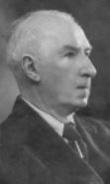James Francis Dwyer was educated in public schools in Campbelltown, New South Wales until the age of 14. He was then sent to live in Sydney with relatives and work as a publisher's clerk. He became a letter-carrier at Rockdale in 1892 and remained in suburban post offices until 1899, at which time he and two associates were convicted of forgery and uttering. Although sentenced to seven years in Grafton gaol he was released after only three.
Dwyer's decision to become a writer had apparently been sparked in the 1890s when he met Robert Louis Stevenson, but he did not begin this path until after being sent to prison. While there one of his poems was published in the Bulletin. He later contributed short stories, verse and 'pars' to the magazine under the names 'J.F.D.', 'Burglar Bill', 'D' and 'Marat' while working variously as a salesman, pigeon-buyer and signwriter. Befriended by a coterie of Bulletin writers he eventually turned to journalism, freelancing for Truth and Sydney Sportsman.
In 1906 Dwyer left Australia for London. Although he had some stories published there these met with little success. The following year he moved to New York, working as a streetcar conductor and in other jobs, while also selling stories. After winning a contest he received a commission to write for Boston's Black Cat magazine. His works later appeared in numerous magazines, ranging from Harper's Bazaar and Collier's to pulp fiction publications such as The Scrap Book, The American Magazine, Short Stories, The Blue Book Magazine, The Cavalier, Munsey's, The Argosy, The Red Book Magazine, The Green Book Magazine, Action Stories and The Popular Magazine.
Writing mainly in the mystery and adventure genres, Dwyer nevertheless also produced a number of speculative fiction works - primarily in the area of horror. To gather material for his settings he travelled in America and Europe. He also briefly revisited Australia in 1913.
In 1921 Dwyer and his second wife (and agent) Catherine Welch established the Dwyer Travel Letters to inform prospective American tourists about places in Europe. Dwyer settled at Pau, in the French Pyrenees, but his search for exotic settings and tourist information, and his wife's interests as a cultural historian, carried them through Europe, Asia and North Africa. Shortly after the war broke the pair escaped to England and later America. They returned to Pau in 1945. Four years later Dwyer published his autobiography, Leg-Irons on Wings.
[Source: Ken Stewart. 'Dwyer, Francis James (1874-1952)'. Australian Dictionary of Biography online]

 5504371400038579463.jpg
5504371400038579463.jpg